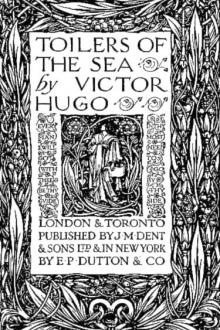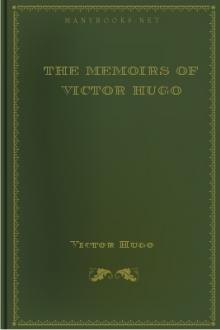Toilers of the Sea by Victor Hugo (trending books to read txt) 📕

- Author: Victor Hugo
- Performer: -
Book online «Toilers of the Sea by Victor Hugo (trending books to read txt) 📕». Author Victor Hugo
He steered, however, pretty nearly as usual.
With regard to Clubin, he had gone, as the reader knows, to sleep at the Jean Auberge.
Clubin always wore, under his shirt, a leathern travelling belt, in which he kept a reserve of twenty guineas; he took this belt off only at night. Inside the belt was his name "Clubin," written by himself on the rough leather, with thick lithographer's ink, which is indelible.
On rising, just before his departure, he put into this girdle the iron box containing the seventy-five thousand francs in bank-notes; then, as he was accustomed to do, he buckled the belt round his body.
III CONVERSATIONS INTERRUPTEDThe Durande started pleasantly. The passengers, as soon as their bags and portmanteaus were installed upon and under the benches, took that customary survey of the vessel which seems indispensable under the circumstances. Two of the passengers—the tourist and the Parisian—had never seen a steam-vessel before, and from the moment the paddles began to revolve, they stood admiring the foam. Then they looked with wonderment at the smoke. Then they examined one by one, and almost piece by piece upon the upper and lower deck, all those naval appliances such as rings, grapnels, hooks and bolts, which, with their nice precision and adaptation, form a kind of colossal bijouterie—a sort of iron jewellery, fantastically gilded with rust by the weather. They walked round the little signal gun upon the upper deck. "Chained up like a sporting dog," observed the tourist. "And covered with a waterproof coat to prevent its taking cold," added the Parisian. As they left the land further behind, they indulged in the customary observations upon the view of St. Malo. One passenger laid down the axiom that the approach to a place by sea is always deceptive; and that at a league from the shore, for example, nothing could more resemble Ostend than Dunkirk. He completed his series of remarks on Dunkirk by the observation that one of its two floating lights painted red was called Ruytingen, and the other Mardyck.
St. Malo, meanwhile, grew smaller in the distance, and finally disappeared from view.
The aspect of the sea was a vast calm. The furrow left in the water by the vessel was a long double line edged with foam, and stretching straight behind them as far as the eye could see.
A straight line drawn from St. Malo in France to Exeter in England would touch the island of Guernsey. The straight line at sea is not always the one chosen. Steam-vessels, however, have, to a certain extent, a power of following the direct course denied to sailing ships.
The wind in co-operation with the sea is a combination of forces. A ship is a combination of appliances. Forces are machines of infinite power. Machines are forces of limited power. That struggle which we call navigation is between these two organisations, the one inexhaustible, the other intelligent.
Mind, directing the mechanism, forms the counterbalance to the infinite power of the opposing forces. But the opposing forces, too, have their organisation. The elements are conscious of where they go, and what they are about. No force is merely blind. It is the function of man to keep watch upon these natural agents, and to discover their laws.
While these laws are still in great part undiscovered, the struggle continues, and in this struggle navigation, by the help of steam, is a perpetual victory won by human skill every hour of the day, and upon every point of the sea. The admirable feature in steam navigation is, that it disciplines the very ship herself. It diminishes her obedience to the winds, and increases her docility to man.
The Durande had never worked better at sea than on that day. She made her way marvellously.
Towards eleven o'clock, a fresh breeze blowing from the nor'-nor'-west, the Durande was off the Minquiers, under little steam, keeping her head to the west, on the starboard tack, and close up to the wind. The weather was still fine and clear. The trawlers, however, were making for shore.
By little and little, as if each one was anxious to get into port, the sea became clear of the boats.
It could not be said that the Durande was keeping quite her usual course. The crew gave no thought to such matters. The confidence in the captain was absolute; yet, perhaps through the fault of the helmsman, there was a slight deviation. The Durande appeared to be making rather towards Jersey than Guernsey. A little after eleven the captain rectified the vessel's course, and put her head fair for Guernsey. It was only a little time lost, but in short days time lost has its inconveniences. It was a February day, but the sun shone brightly.
Tangrouille, in his half-intoxicated state, had not a very sure arm, nor a very firm footing. The result was, that the helmsman lurched pretty often, which also retarded progress.
The wind had almost entirely fallen.
The Guernsey passenger, who had a telescope in his hand, brought it to bear from time to time upon a little cloud of grey mist, lightly moved by the wind, in the extreme western horizon. It resembled a fleecy down sprinkled with dust.
Captain Clubin wore his ordinary austere, Puritan-like expression of countenance. He appeared to redouble his attention.
All was peaceful and almost joyous on board the Durande. The passengers chatted. It is possible to judge of the state of the sea in a passage with the eyes closed, by noting the tremolo of the conversation about you. The full freedom of mind among the passengers answers to the perfect tranquillity of the waters.
It is impossible, for example, that a conversation like the following could take place otherwise than on a very calm sea.
"Observe that pretty green and red fly."
"It has lost itself out at sea, and is resting on the ship."
"Flies do not soon get tired."
"No doubt; they are light; the wind carries them."
"An ounce of flies was once weighed, and afterwards counted; and it was found to comprise no less than six thousand two hundred and sixty-eight."
The Guernsey passenger with the telescope had approached the St. Malo cattle dealers; and their talk was something in this vein:
"The Aubrac bull has a round and thick buttock, short legs, and a yellowish hide. He is slow at work by reason of the shortness of his legs."
"In that matter the Salers beats the Aubrac."
"I have seen, sir, two beautiful bulls in my life. The first has the legs low, the breast thick, the rump full, the haunches large, a good length of neck to the udder, withers of good height, the skin easy to strip. The second had all the signs of good fattening, a thick-set back, neck and shoulders strong, coat white and brown, rump sinking."
"That's the Cotentin race."
"Yes; with a slight cross with the Angus or Suffolk bull."
"You may believe it if you please, sir, but I assure you in the south they hold shows of donkeys."
"Shows of donkeys?"
"Of donkeys, on my honour. And the ugliest are the most admired."
"Ha! it is the same as with the mule shows. The ugly ones are considered best."
"Exactly. Take also the Poitevin mares; large belly, thick legs."
"The best mule known is a sort of barrel upon four posts."
"Beauty in beasts is a different thing from beauty in men."
"And particularly in women."
"That is true."
"As for me, I like a woman to be pretty."
"I am more particular about her being well dressed."
"Yes; neat, clean, and well set off."
"Looking just new. A pretty girl ought always to appear as if she had just been turned out by a jeweller."
"To return to my bulls; I saw these two sold at the market at Thouars."
"The market at Thouars; I know it very well. The Bonneaus of La Rochelle, and the Babas corn merchants at Marans, I don't know whether you have heard of them attending that market."
The tourist and the Parisian were conversing with the American of the Bibles.
"Sir," said the tourist, "I will tell you the tonnage of the civilised world. France 716,000 tons; Germany 1,000,000; the United States, 5,000,000; England, 5,500,000; add the small vessels. Total 12,904,000 tons, carried in 145,000 vessels scattered over the waters of the globe."
The American interrupted:
"It is the United States, sir, which have 5,500,000."
"I agree," said the tourist. "You are an American?"
"Yes, sir."
"I agree again."
There was a pause. The American missionary was considering whether this was a case for the offer of a Bible.
"Is it true, sir," asked the tourist, "that you have a passion for nicknames in America, so complete, that you confer them upon all your celebrated men, and that you call your famous Missouri banker, Thomas Benton, 'Old Lingot'?"
"Yes; just as we call Zachary Taylor 'Old Zach.'"
"And General Harrison, 'Old Tip;' am I right? and General Jackson, 'Old Hickory?'"
"Because Jackson is hard as hickory wood; and because Harrison beat the redskins at Tippecanoe."
"It is an odd fashion that of yours."
"It is our custom. We call Van Buren 'The Little Wizard;' Seward, who introduced the small bank-notes, 'Little Billy;' and Douglas, the democrat senator from Illinois, who is four feet high and very eloquent, 'The Little Giant.' You may go from Texas to the State of Maine without hearing the name of Mr. Cass. They say the 'Great Michiganer.' Nor the name of Clay; they say 'The miller's boy with the scar.' Clay is the son of a miller."
"I should prefer to say 'Clay' or 'Cass,'" said the Parisian. "It's shorter."
"Then you would be out of the fashion. We call Corwin, who is the Secretary of the Treasury, 'The Waggoner-boy;' Daniel Webster, 'Black Dan.' As to Winfield Scott, as his first thought after beating the English at Chippeway, was to sit down to dine, we call him 'Quick—a basin of soup.'"
The small white mist perceived in the distance had become larger. It filled now a segment of fifteen degrees above the horizon. It was like a cloud loitering along the water for want of wind to stir it. The breeze had almost entirely died away. The sea was glassy. Although it was not yet noon, the sun was becoming pale. It lighted but seemed to give no warmth.
"I fancy," said the tourist, "that we shall have a change of weather."
"Probably rain," said the Parisian.
"Or fog," said the American.
"In Italy," remarked the tourist, "Molfetta is the place where there falls the least rain; and Tolmezzo, where there falls the most."
At noon, according to the usage of the Channel Islands, the bell sounded for dinner. Those dined who desired. Some passengers had brought with them provisions, and were eating merrily on the after-deck. Clubin did not eat.
While this eating was going on, the conversations continued.
The Guernsey man, having probably a scent for Bibles, approached the American. The latter said to him:
"You know this sea?"
"Very well; I belong to this part."
"And I, too," said one of the St. Malo men.
The native of Guernsey followed with a bow and continued:
"We are fortunately well out at sea now; I should not have liked a fog when we were off the Minquiers."
The American said to the St. Malo man:
"Islanders are more at home on the sea than the folks of the coast."
"True; we coast people are only half dipped in salt water."
"What are the Minquiers?" asked the American.
The St. Malo man replied:
"They are an ugly reef of rocks."
"There are also the Grelets," said the Guernsey man.
"Parblus!" ejaculated the other.
"And the Chouas," added the Guernsey man.
The inhabitant of St. Malo laughed.
"As for that," said he, "there are the Savages also."
"And the Monks," observed the Guernsey man.
"And the Duck," cried the





Comments (0)